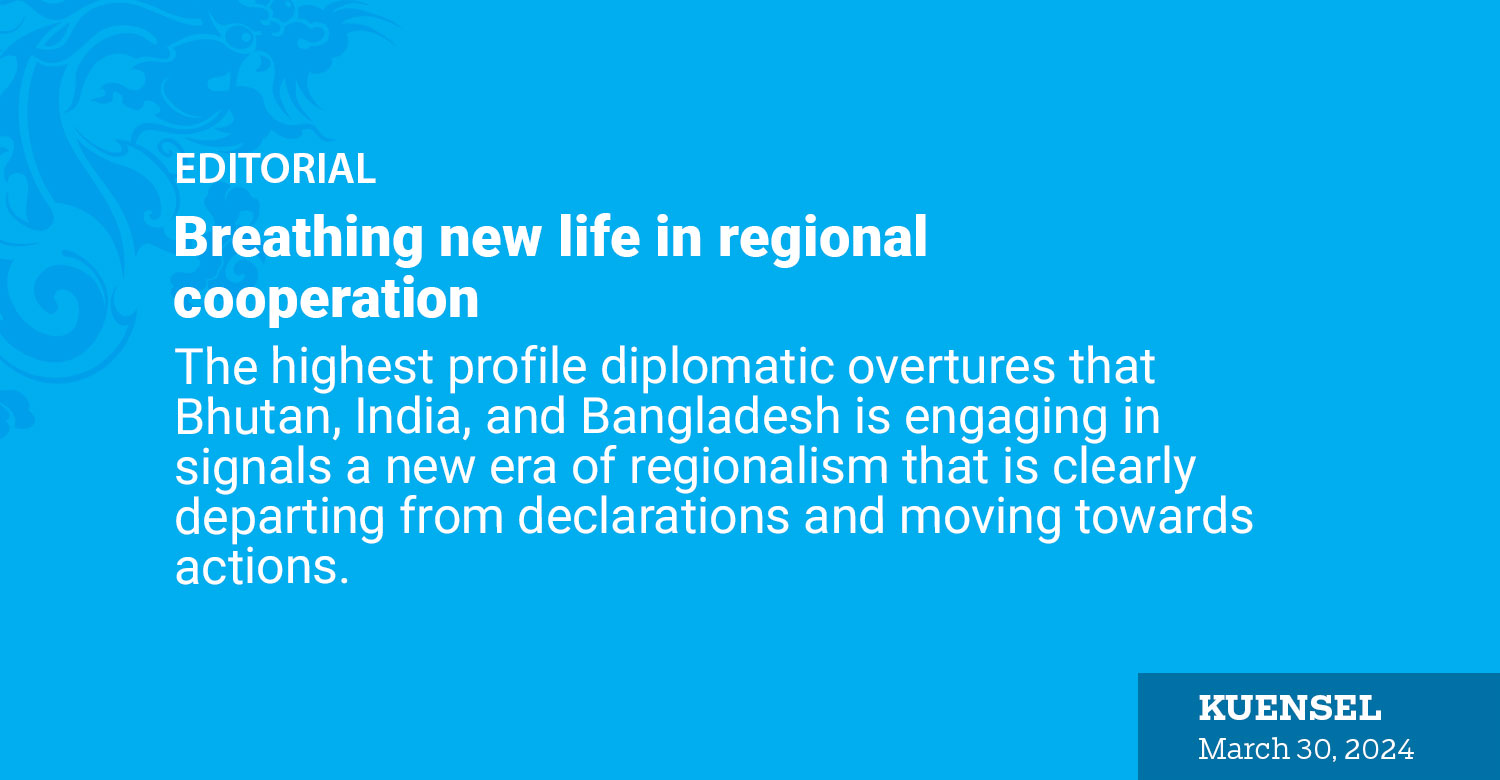The highest profile diplomatic overtures that Bhutan, India, and Bangladesh is engaging in signals a new era of regionalism that is clearly departing from declarations and moving towards actions.
The back-to-back visit of Prime Minister Tshering Tobgay and Indian Prime Minister Narendra Modi, was both symbolic as well as symbiotic in significance. The historical bilateral relations rooted in mutual trust and confidence continue to define the Bhutan-India relations. Even if mindful as a strategic necessity, Bhutan has always respected the historical ties with India, and shown diplomatic leadership in the region as a stable and predictable partner.
His Majesty The King, Her Majesty The Gyaltsuen, and Their Royal Highnesses Gyalsey Jigme Namgyel Wangchuck, Gyalsey Ugyen Wangchuck, and Gyalsem Sonam Yangden Wangchuck, visited Bangladesh on a special invitation of President of Bangladesh Mohammed Shahabuddin, to observe the Independence Day of Bangladesh.
As the first country to recognize independent Bangladesh in 1971, Bhutan remains close in the hearts of people of Bangladesh where friendship underscores diplomatic ties.
It was the idea of a triangular alliance between Bhutan-Bangladesh-India, that provided then Bangladeshi President Zia-ur Raman in 1980, the idea for a regional cooperation with other nations based upon the principles of peace, stability, amity, and progress that culminated into the collective body of SAARC.
The diplomatic visits of the past week resulted in cooperation and support in critical areas of health, education, trade and commerce, transportation and connectivity between Bhutan and India, and between Bhutan and Bangladesh.
Beyond and on a broader level, however, it signals other member states in the region that the evolutionary path towards economic prosperity must gain greater traction, despite political setbacks that occasionally slowdown, and even derail the progress. And that a greater economic interdependence among the member states will remain key to a shared prosperity transcending political boundaries, and in ensuring security in the region.
To the point of becoming embarrassing, South Asia is still backward and home to a significant number of the world’s poor, sick, illiterate, and undernourished.
Observers point that economic cooperation could produce significant benefits providing pathways for cooperation in crucial areas, including security. More than ever before, cooperating and collaborating on response and mitigation on adverse impact of climate change, transboundary pollution, pandemic, and natural calamities have become urgent today. South Asia had the second highest number and proportion of extremely poor, next only to sub-Saharan Africa, according to data with World Bank.
Sharing and adopting knowledge, technology, human and capital resources could present an opportunity for a collective growth and prosperity that will in return help stablise, and strengthen the peace and security in the region.
But economic integration needed to be politically attractive, administratively feasible, and physically integrated through road and rail network. As Indian Prime Minister Modi said during his visit to Bhutan on March 22, strengthening people-to-people relationships was equally important in bilateral and regional ties. To be sure, a seamless opportunity for exchange and intercourse among the people in day-to-day life, including but not limited to culture, commerce and trade, education and entertainment would bolster bilateral ties.
In that, the call is clear for the South Asian neighbours – that the states in the region must be able to share the opportunities of associating with SAARC, whereas remaining distant would only deprive for a collective growth and shared prosperity and happiness. In that, the diplomacy in South Asia must evolve a new paradigm that is inclusive, participatory, and engaged, and without dominance or disadvantaged as a result of the size and capacity of a member state.
A SAARC rising from the ashes of war, mutual suspicion, and distrust, but committed to economic cooperation, people-to-people relationship, and integration should be the new life for the way forward.


